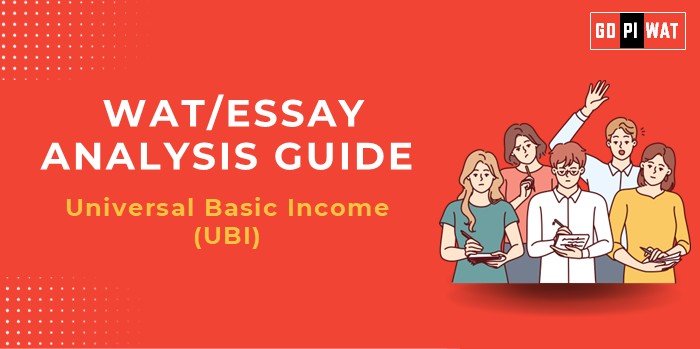📋 Written Ability Test (WAT)/Essay Analysis Guide
Topic: Universal Basic Income (UBI): Opportunities and Challenges
🌟 Understanding UBI’s Importance
Universal Basic Income (UBI) is a significant policy proposal aimed at addressing poverty, income inequality, and economic instability. For B-school students, analyzing UBI involves understanding its economic implications, feasibility, and potential impact on social structures and labor markets.
⏱️ Effective Planning and Writing
- Time Allocation:
- 📝 Reading and Planning: 5 minutes
- ✍️ Writing: 20 minutes
- 🔍 Review: 5 minutes
- Preparation Tips:
- Identify relevant global and local case studies, such as Kenya’s GiveDirectly pilot and SEWA’s UBI experiment in India.
- Prepare key statistics, such as the proportion of global poverty and the estimated costs of implementing UBI in developing nations.
💡 Introduction Techniques
- Contrast Approach:
“While Universal Basic Income promises to eliminate poverty and reduce inequality, the fiscal constraints of developing nations raise significant questions about its feasibility.”
- Solution-Based Approach:
“Could hybrid models of Universal Basic Income, incorporating targeted subsidies and phased rollouts, strike a balance between ambition and practicality for developing nations?”
- Historical Context Approach:
“From Thomas Paine’s advocacy in the 18th century to contemporary pilots in Kenya and India, Universal Basic Income has evolved as a bold policy idea to address systemic inequality.”
📊 Structuring the Essay Body
🏆 Achievements
- 📜 Case Studies:
- SEWA’s UBI pilot in Madhya Pradesh improved educational outcomes and health metrics, with participants spending more on nutrition and schooling.
- Kenya’s GiveDirectly program increased savings, housing quality, and local economic activity in rural areas.
- 🌍 Global Context: Finland’s pilot showed enhanced well-being and reduced stress among recipients.
⚠️ Challenges
- 💰 Fiscal Constraints: UBI could cost 4–5% of GDP in India, equivalent to the combined budget of health, education, and social welfare.
- 📈 Inflation Risks: A large influx of cash without increasing the supply of goods and services can drive prices higher, negating benefits.
- 💼 Work Disincentives: Guaranteed income might reduce labor force participation, especially in low-skill sectors.
🚀 Future Outlook
- 🔗 Hybrid Models: Combine unconditional payments with targeted subsidies for vulnerable populations.
- 📊 Phased Implementation: Use pilot programs to test feasibility and refine delivery mechanisms.
- 💻 Role of Technology: Employ digital wallets and Aadhaar-linked transfers to ensure efficient and transparent fund distribution.
📄 Concluding Effectively
- Balanced Conclusion:
“Universal Basic Income holds transformative potential for addressing poverty and inequality in developing nations. However, its success depends on innovative financing strategies, phased rollouts, and robust infrastructure to minimize risks and ensure sustainability.”
- Global Perspective Conclusion:
“While Finland’s and Kenya’s pilots have demonstrated promising outcomes, developing nations must tailor UBI models to their unique fiscal capacities and socio-economic contexts to maximize impact.”
📈 Analyzing Successes and Shortcomings
✅ Key Achievements
- Demonstrated improvements in quality of life in UBI pilot regions.
- Simplification of welfare programs by reducing administrative layers.
- Encouragement of entrepreneurship and education investments.
⚠️ Ongoing Challenges
- Lack of adequate funding sources in developing economies.
- Risks of inflationary pressures and economic distortions.
- Potential misuse of funds or corruption in large-scale programs.
🌍 Global Context
- Finland’s pilot showed improvements in well-being but raised concerns about long-term employment impact.
- Kenya’s program highlighted significant poverty reduction but depended heavily on external funding.
🌟 Recommendations for Sustainable Progress
- 📜 Adopt Hybrid Models: Combine partial UBI with existing welfare programs to ensure targeted assistance.
- 💻 Leverage Technology: Use digital platforms like Aadhaar-linked accounts for efficient fund transfers and to minimize leakages.
- 💡 Secure Innovative Funding: Explore funding through progressive taxation, reduced subsidies for fossil fuels, or reallocating existing welfare budgets.
✍️ Sample Short Essays
- Balanced Perspective:
“Universal Basic Income (UBI) offers a bold solution to address poverty and inequality. While successful pilots in Kenya and India show promise, developing nations face significant challenges, including fiscal constraints and implementation risks. By adopting hybrid models and leveraging technology, UBI can become a sustainable tool for inclusive development.”
- Solution-Oriented:
“For developing nations, Universal Basic Income presents a pathway to poverty alleviation and economic empowerment. A phased approach, supported by technology and innovative financing mechanisms like wealth taxes, can ensure the program’s sustainability while addressing the socio-economic disparities prevalent in these countries.”
- Global Comparison:
“Universal Basic Income has shown varying results globally, from Finland’s improvement in well-being to Kenya’s impact on poverty reduction. Developing nations must learn from these pilots to create tailored UBI models that balance ambition with practicality, ensuring fiscal sustainability and socio-economic inclusivity.”


